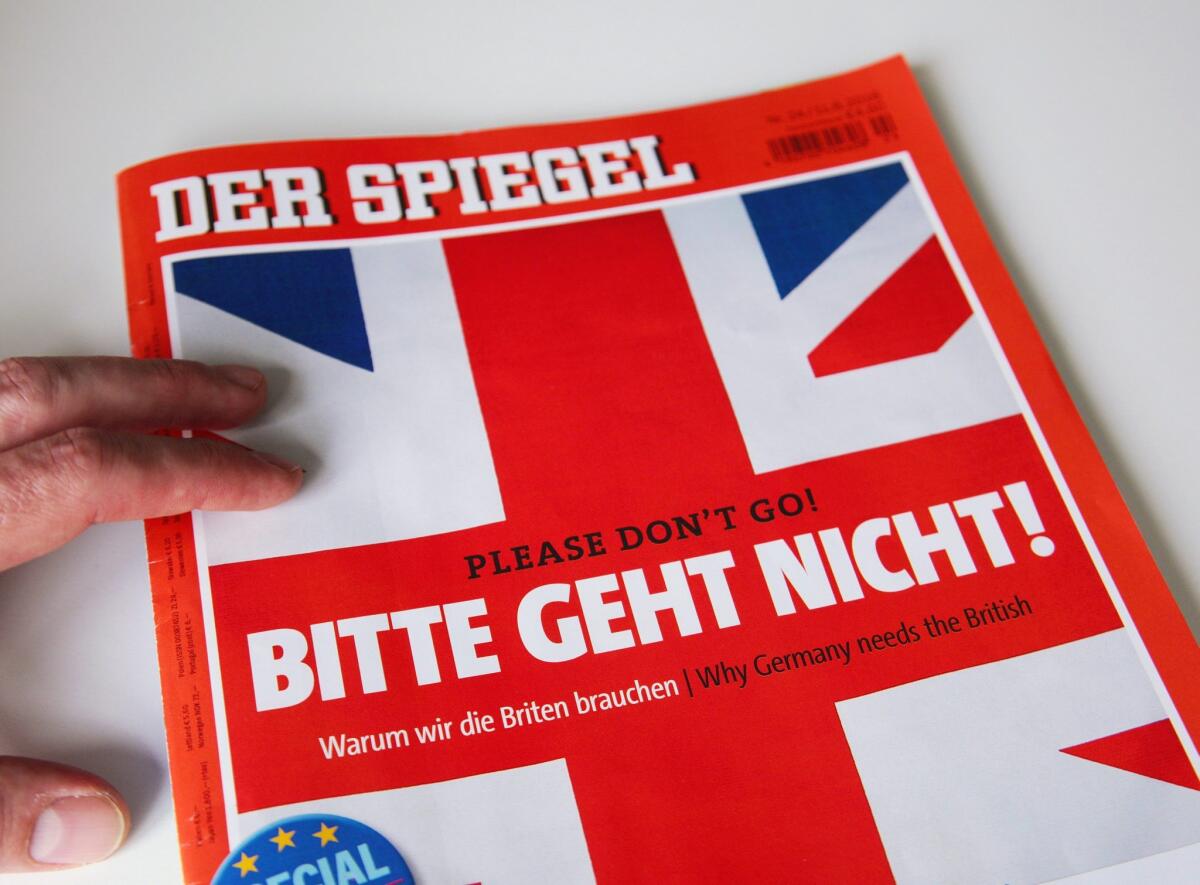In Germany, fears that a British exit could be ‘the beginning of the end of the EU’

Reporting from Berlin — The debate over whether Britain should exit the European Union has swirled around such issues as immigration and jobs. But here in Germany, the big fear is that that the departure of its most important free-market ally could leave the continent’s economic powerhouse perilously isolated.
Approval of a so-called Brexit by British voters on Thursday could be devastating for Germany, whose free-trade, pro-markets Weltanschauung could find itself, without Britain, newly challenged by calls for even more extensive social welfare policies and creeping protectionism in a smaller and diminished EU.
Britain’s departure could upset what has been a delicate balance of power, forcing Germany to take a leadership role that it has long eschewed, in part for fear of awakening the ghosts of its early and mid-20th century attempts to dominate Europe.
It would be a nightmare for Germany if Britain votes to leave the EU.
— Ingo Peters, political scientist at Berlinâs Free University
These fears are especially prominent in France, which has long relied on Britain as a counterweight to its powerful neighbor.
The biggest worry is that a British exit could lead to the unraveling of the 28-member European Union itself after six decades of peace and prosperity on a multi-ethnic, multi-lingual continent that had been scarred by centuries of warfare.
“It would be a nightmare for Germany if Britain votes to leave the EU,” said Ingo Peters, a political scientist at Berlin’s Free University. “It would be negative not only for the obvious economic reasons and trade issues, but ‘Brexit’ would also undermine institutions such as the EU, as well as NATO.”
Not far down the road, he said, “we’ll see a return of fears of a ‘German hegemony,’ and cartoons...around Europe of [German Chancellor Angela] Merkel wearing a Hitler mustache.”
The vote in Britain is expected to be extremely close. Opinion polls published Monday from other EU countries, on the other hand, showed overwhelming support for the ‘Remain’ campaign.
“You can feel that this is an historic moment – the end of one era and the start of something new,” European Council President Donald Tusk said in an interview with Germany’s Bild newspaper.
“No one can foresee the long-term consequences of Brexit,” Tusk said. “I fear, as a trained historian myself, it could be the beginning of the end of the EU and political civilization in the West.”
In a research note for the geopolitical consulting firm Stratfor on Tuesday, Adriano Bosoni argued that Europe’s ability to handle shocks such as the eurozone crisis, the massive influx of refugees and a more assertive Russia could be weakened. “If Britain withdraws from the continental bloc, its primary effect would be geopolitical, shaking the balance of power in Europe to its very foundation and forcing the bloc to rethink its role in the world,” Bosoni wrote.
Contagion is a palpable fear, with some leaders in Scotland raising the prospect of another vote for independence from Britain in order to remain in the EU. There are worries that nationalist groups will seize on Britons’ bid for more control over immigration and fiscal policies to push for their own EU divorces.
“There’s a clear danger of a domino effect,” said Ulrike Guerot, director of the European Democracy Lab at the European School of Governance in Berlin. ”Voters in other countries after this will be saying, we want to vote on the EU too.”
Merkel has sought to stay out of the fray, fearing her opposition could be counterproductive. Yet she has not remained entirely silent. “I would personally hope and wish for the United Kingdom to stay part and parcel of the EU,” she said recently. “We work together well. And whenever we negotiate new rules, you can have more of an influence on the debate when you’ve got a seat at the table than you have when you’re on the outside.”
German Finance Minister Wolfgang Schaeuble bluntly warned Britain that it should not expect any special treatment if it votes to leave. “In is in and out is out,” he told Der Spiegel magazine recently in an issue, published in both German and English, with a cover that said: “Please don’t go.”
Years of free trade are at stake for both Germany and Britain.
Britain is Germany’s third largest export market, purchasing 120 billion euros a year worth of goods and services and more German cars than any other country. An estimated 45% of Britain’s exports are destined for EU countries.
Munich’s Ifo Institute for Economic Research recently calculated that Britain’s exit could cost Germany an immediate 0.1 to 0.3 percentage points of gross domestic growth per year, and up to three percentage points over the long run.
“Germany would probably be the biggest loser of a Brexit,” Ifo President Clemens Fuest said, “aside from Britain itself.”
Kirschbaum is a special correspondent
ALSO
Column: ‘Brexit’ is just a symptom of a larger crisis
Potential for ‘Brexit’ adds to need for rate hike caution, Fed’s Janet Yellen says
U.S. stocks hold steady as ‘Brexit’ vote nears
Op-Ed: Dear Brits: Don’t listen to the U.S. on ‘Brexit’
More to Read
Sign up for Essential California
The most important California stories and recommendations in your inbox every morning.
You may occasionally receive promotional content from the Los Angeles Times.










